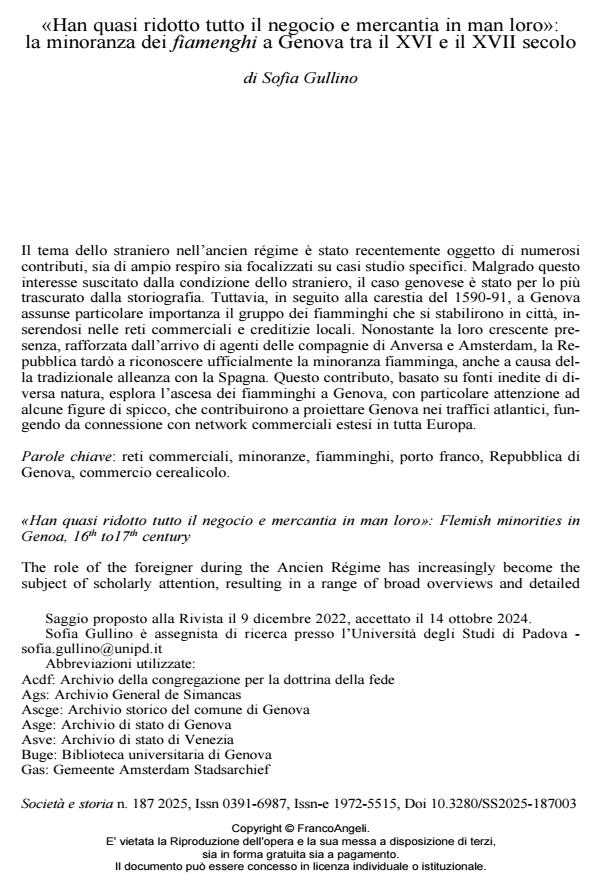«Han quasi ridotto tutto il negocio e mercantia in man loro»: la minoranza dei fiamenghi a Genova tra il XVI e il XVII secolo
Titolo Rivista SOCIETÀ E STORIA
Autori/Curatori Sofia Gullino
Anno di pubblicazione 2025 Fascicolo 2025/187
Lingua Italiano Numero pagine 30 P. 34-63 Dimensione file 205 KB
DOI 10.3280/SS2025-187003
Il DOI è il codice a barre della proprietà intellettuale: per saperne di più
clicca qui
Qui sotto puoi vedere in anteprima la prima pagina di questo articolo.
Se questo articolo ti interessa, lo puoi acquistare (e scaricare in formato pdf) seguendo le facili indicazioni per acquistare il download credit. Acquista Download Credits per scaricare questo Articolo in formato PDF

FrancoAngeli è membro della Publishers International Linking Association, Inc (PILA)associazione indipendente e non profit per facilitare (attraverso i servizi tecnologici implementati da CrossRef.org) l’accesso degli studiosi ai contenuti digitali nelle pubblicazioni professionali e scientifiche
Il tema dello straniero nell’ancien régime è stato recentemente oggetto di numerosi contributi, sia di ampio respiro sia focalizzati su casi studio specifici. Malgrado questo interesse suscitato dalla condizione dello straniero, il caso genovese è stato per lo più trascurato dalla storiografia. Tuttavia, in seguito alla carestia del 1590-91, a Genova assunse particolare importanza il gruppo dei fiamminghi che si stabilirono in città, inserendosi nelle reti commerciali e creditizie locali. Nonostante la loro crescente presenza, rafforzata dall’arrivo di agenti delle compagnie di Anversa e Amsterdam, la Repubblica tardò a riconoscere ufficialmente la minoranza fiamminga, anche a causa della tradizionale alleanza con la Spagna. Questo contributo, basato su fonti inedite di diversa natura, esplora l’ascesa dei fiamminghi a Genova, con particolare attenzione ad alcune figure di spicco, che contribuirono a proiettare Genova nei traffici atlantici, fungendo da connessione con network commerciali estesi in tutta Europa.
Parole chiave:reti commerciali, minoranze, fiamminghi, porto franco, Repubblica di Genova, commercio cerealicolo.
Sofia Gullino, «Han quasi ridotto tutto il negocio e mercantia in man loro»: la minoranza dei fiamenghi a Genova tra il XVI e il XVII secolo in "SOCIETÀ E STORIA " 187/2025, pp 34-63, DOI: 10.3280/SS2025-187003